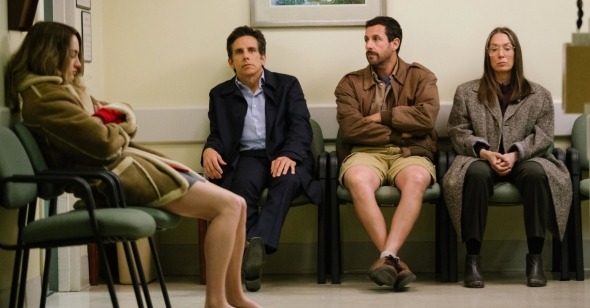Damage Control
By Vadim Rizov
The Meyerowitz Stories (New and Selected)
Dir. Noah Baumbach, U.S., Netflix
Adam Sandler and Ben Stiller have been onscreen together once before—21 years ago, in Happy Gilmore. Each has performed in a select number of categorically “serious” films since, but Stiller has always been the critical Gallant to Sandler’s Goofus: they’ve both made a considerable amount of lazy dreck, but nobody seems surprised when Stiller delivers a credible dramatic turn. Not so for Sandler—despite estimable performances in Punch-Drunk Love, Spanglish, and Funny People. He can do no right, and this dynamic’s built into The Meyerowitz Stories (New and Selected). Sandler’s Danny—once a musician and hence closer to the artistic bent of sculptor father Harold (Dustin Hoffman) than accountant brother Matthew (Stiller)—has spent more time looking after dad: nevertheless, he finds himself less preferred than Matthew, who moved to L.A. long ago but whose name serves as Harold’s login password.
Sandler sports a bad-idea mustache that makes him look hangdog forlorn in a part tailored to his strengths: he gets to both sing and yell at people. He punches a wall after being asked why he’s so sad, a response totally in keeping with the actor’s persona. Stiller continues in the vein of his parts in Greenberg and While We’re Young, playing another impossibly tightly wound man, albeit more fiscally successful than in his previous incarnations. At the film’s post-premiere Cannes press conference, Stiller claimed that he had reservations about taking a part so similar to his previous collaborations with Baumbach, but he’s proven a reliable onscreen alter-ego for the director over a series of films about fractious irritability and familial fallout that are increasingly self-referential.
The title is Baumbach’s most Jewish since Greenberg, and connecting pioneer star Hoffman to unlikely beneficiary protégés Sandler/Stiller underlines the emphasis. The anxieties of attempting to ameliorate WASPs, which fueled Meet the Parents (and which have never troubled Sandler), are off the table here—it’s a strictly family affair. Meyerowitz is a companion piece to The Squid and the Whale, another story about two siblings perpetually reeling in the wake of their dad's ever-ruinous presence, which likewise climaxes with a symbolic trip to the museum—the Whitney, in this case, with Baumbach’s cinema studies scholar brother Nico cameoing as a docent. Squid's brothers were adolescents and teenagers, these are middle-aged men; but the damage continually being done is no less meaningful for being removed from the moment of greatest formative impact.
Meyerowitz splits the tonal difference between his kinder Greta Gerwig collaborations (Frances Ha, Mistress America) and the more acerbic works surrounding those, dealing with the previously unlikely possibility of forgiveness and healing. In the film’s first two chapters, we’re introduced first to Danny, then Matthew, establishing their individual dynamics in relation to their father before zooming out for a larger familial portrait. Recently divorced Danny puts up with his father’s every self-aggrandizing snub; Matthew has moved to L.A., and when he returns to NYC for a visit it doesn’t take long for him to explode at his father: “I got your focus, and that fucked me up.” Left implicit is the likelihood that Harold—a sculptor with one piece in the Whitney but a somewhat marginal figure—is approaching senility, which possibly mitigates the benefits of raging against him. Early on, Harold and Danny go to a show at MoMA, a retrospective of one of the sculptor’s much more successful contemporaries. Here, Harold is briefly introduced to A Major Star (don’t look at the cast list and save yourself a surprise), in a meeting that’s brief and clearly of no interest to the celebrity. Harold will retell and embellish this trivial encounter throughout the film, reflecting the degree to which he’s accustomed to lying to others and himself. A moment is clearly approaching where Harold won’t be all there; if there’s a time to seek closure, now might be the moment.
There is a third Meyerowitz sibling, sister Jean, played by Elizabeth Marvel, the film’s breakout performer. She is decidedlynot the film’s focus; her one monologue is labeled, in parentheticals, “Jean’s story,” and standing outside the circle of male anxiety she sees them more clearly than they can see themselves. “You were both such middle-aged men in the making,” she tells the brothers. “You guys will never understand what it’s like to be a woman in this family.” Meyerowitz is a Male Anxiety movie, and part of that anxiety is one of legacy and responsibility; in Mistress America, the budding writer protagonist worried that artistic greatness might require personal ghastliness, and similarly the brothers wonder of their dad, “If he wasn’t a great artist, that means he’s just a prick.” Likewise, time is spent dwelling on midtown Manhattan’s decline from overbuilding; as in pretty much every Baumbach film, material stability and familiarity with tony environs are unquestioned givens. Also intact is Baumbach’s oddest and most strangely endearing tic: showing clips from or citing a litany of completely non-notable films whose existence you’ve long forgotten—his films form an unlikely index of forgettable studio garbage. (This is presumably the first and last time anyone will ever cite Sex Tape.) Dialogue still tumbles out at a freakishly random clip, the quotable anger unspools without pause and the tone is still determinedly small-scale.
What’s new is a certain tempered magisterial nature, signaled in the anthology-suggesting title—which acknowledges themes being reiterated and added to the list of known Baumbach concerns—chapter intertitles with a literary flair, and a climactic almost-confrontation with a camera rapidly cutting in on an axis towards Sandler in a move straight out of Desplechin. Baumbach may be past the point where his work will convert skeptics, but his technical acumen is increasingly refined with each film, and the cumulative emotional impact of a nearly pin-drop-quiet coda is in inverse proportion to its volume.
